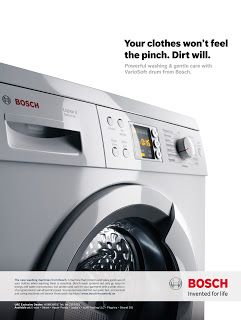How to build a brand.
Bosch is a brand I’m familiar with on a couple of levels. First I know the name, so that means I’ve seen it on product, in retail and probably advertising. Second, I have brand associations, but across a couple of types of products: brakes come to mind, automotive products, some speakers. So it seems Bosch is some sort of conglomerate… like GE. Also they feel European.
But about 2 or 3 years ago, Bosch started advertising in my the newspaper, The New York Times. I don’t recall seeing Bosch on TV, in radio or online, just the Times. And they have kept up the media pressure. With drumbeats. The ads are all focused on kitchen appliances. I wasn’t aware they were in that business. And the appliances are beautiful. No skimping on the photography costs here. I cannot recite a headline or copy points, though these ads are burned into my memory. Product as hero, at its best. Here’s what I know and feel thanks to the advertising: the product design is spectacular, the engineering way above average (that’s what good industrial design will earn you) and the appliances quiet and efficient. Most important, they are now in my consideration set where once they weren’t.
I am not a fan of awards ads and today Bosch ran one about customer satisfaction with their dishwashers. It was a prudent choice to wait so long to do an awards ad.
The seer in me says, Bosch is gaining in market share and the blocking and tackling they are doing – beyond excellent product design – is the cause. Old school. Peace in the New Year.



